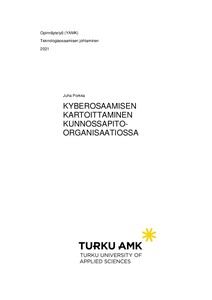Kyberosaamisen kartoittaminen kunnossapito-organisaatiossa
Porkka, Juha (2021)
Porkka, Juha
2021
All rights reserved. This publication is copyrighted. You may download, display and print it for Your own personal use. Commercial use is prohibited.
Julkaisun pysyvä osoite on
https://urn.fi/URN:NBN:fi:amk-202103233715
https://urn.fi/URN:NBN:fi:amk-202103233715
Tiivistelmä
Digitalisaatio ja erilaisten tietoteknisten järjestelmien huima kehittyminen pakottaa yritykset ja julkisen hallinnon organisaatot tilanteeseen, jossa niiden on pakko ottaa kyberturvallisuus ja kybersietoisuus huomioon oman toiminnan suunnittelussa niin henkilöstön kuin tietoteknisten järjestelmien osalta. Tämän opinnäytetyön tavoitteena oli kartoittaa suomalaisen elinjakson hallinnan palveluita tuottavan yrityksen kunnossapitoinsinöörien kyberosaaminen kolmella eri toimipisteellä, jotka sijaitsivat eri puolilla Suomea. Osaamiskartoituksen keskeisin teema oli keskittyä järjestelmien kunnossapitoinsinööreillä olevaan osaamiseen kybersietoisuuden näkökulmasta.
Opinnäytetyön teoreettinen viitekehys pohjautui yhteiskunnan kriittisten toimintojen ja toimialojen kyberturvallisuuden sekä kybersietoisuuden kehittämiselle. Lisäksi mukaan otettiin ihmisten ammatillisen ja muun osaamisen kehittymistä ja keinoja osaamisen kehittämiseksi. Toimeksiannon osaamisvaatimusten pohjana toimiva kansallinen auditointikriteeristö (Katakri) ja sieltä valitut kunnossapidon osaamisvaatimukset olivat myös tärkeä osa tämän opinnäytetyön teoreettista viitekehystä.
Opinnäytetyön tutkimusosuus suoritettiin käyttäen puolistrukturoitua haastattelua, joka tutkimusmenetelmänä kuuluu kvalitatiivisiin menetelmiin. Kolmelta paikkakunnalta haastateltiin yhteensä kuuttatoista erilaisten teknisten järjestelmien kunnossapidosta vastaavaa järjestelmäinsinööriä. Työn tuloksena saatiin kartoitettua ja dokumentoitua kaikkien kolmen toimipisteen kyberosaaminen osaamismatriisiin. Lisäksi onnistuttiin paikantamaan ydinosaamisen sijainti ja saamaan selkeä kuva henkilöstön koulutustarpeista ja tarpeellisen koulutuksen sisällöstä. Osaamiskartoituksen lisäksi tutkimuksen tuloksena kirjattiin organisaatiota koskevia kybersietoisuuden kehitysehdotuksia. The digitalization and dramatic technological development of information technology systems are forcing companies and the public sector to the situation where they must take cybersecurity and cyber resilience into account in general as well as when developing technical systems and human resources. The present Master ́s thesis discusses the cybersecurity competences of maintenance engineers working for a Finnish company that offers life cycle management services for its clients. These engineers were working in three different locations around Finland. The main theme of this competence study was to focus on cyber resilience competences of system maintenance engineers.
The theoretical framework of the study is based on the development of cyber security and cyber resilience in the critical functions and industries of the society. In addition, the development of people's professional and other skills is discussed. The national audit criteria (Katakri), which serve as the basis for the competence requirements of the study and the maintenance competence requirements selected therefrom, are also an important part of the theoretical framework of this Master ́s thesis.
A semi-structured interview, which is a research method belonging to the qualitative methods, was used in the research part of the study. In total, sixteen system engineers responsible for the maintenance of various technical systems from three different locations were interviewed. The cyber competence of all three locations was mapped and documented on the competence matrix as a result of the study. The core competences and a clear picture of the training needs and necessary content were analysed according to the location and documented. The development proposals for the cyber resilience actions of a maintenance organization were also recorded.
Opinnäytetyön teoreettinen viitekehys pohjautui yhteiskunnan kriittisten toimintojen ja toimialojen kyberturvallisuuden sekä kybersietoisuuden kehittämiselle. Lisäksi mukaan otettiin ihmisten ammatillisen ja muun osaamisen kehittymistä ja keinoja osaamisen kehittämiseksi. Toimeksiannon osaamisvaatimusten pohjana toimiva kansallinen auditointikriteeristö (Katakri) ja sieltä valitut kunnossapidon osaamisvaatimukset olivat myös tärkeä osa tämän opinnäytetyön teoreettista viitekehystä.
Opinnäytetyön tutkimusosuus suoritettiin käyttäen puolistrukturoitua haastattelua, joka tutkimusmenetelmänä kuuluu kvalitatiivisiin menetelmiin. Kolmelta paikkakunnalta haastateltiin yhteensä kuuttatoista erilaisten teknisten järjestelmien kunnossapidosta vastaavaa järjestelmäinsinööriä. Työn tuloksena saatiin kartoitettua ja dokumentoitua kaikkien kolmen toimipisteen kyberosaaminen osaamismatriisiin. Lisäksi onnistuttiin paikantamaan ydinosaamisen sijainti ja saamaan selkeä kuva henkilöstön koulutustarpeista ja tarpeellisen koulutuksen sisällöstä. Osaamiskartoituksen lisäksi tutkimuksen tuloksena kirjattiin organisaatiota koskevia kybersietoisuuden kehitysehdotuksia.
The theoretical framework of the study is based on the development of cyber security and cyber resilience in the critical functions and industries of the society. In addition, the development of people's professional and other skills is discussed. The national audit criteria (Katakri), which serve as the basis for the competence requirements of the study and the maintenance competence requirements selected therefrom, are also an important part of the theoretical framework of this Master ́s thesis.
A semi-structured interview, which is a research method belonging to the qualitative methods, was used in the research part of the study. In total, sixteen system engineers responsible for the maintenance of various technical systems from three different locations were interviewed. The cyber competence of all three locations was mapped and documented on the competence matrix as a result of the study. The core competences and a clear picture of the training needs and necessary content were analysed according to the location and documented. The development proposals for the cyber resilience actions of a maintenance organization were also recorded.
